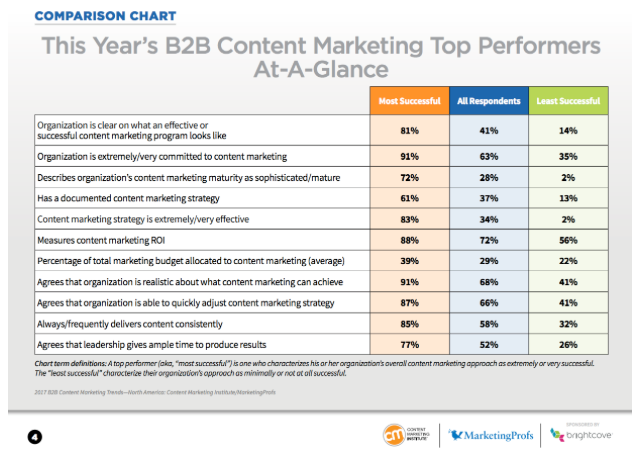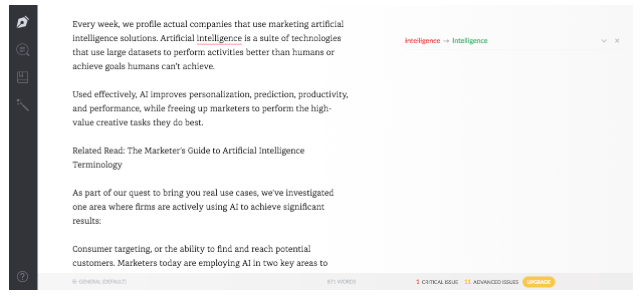Content marketers face some tough uphill battles.
They need to create more content than ever. That content faces more competition than ever, so it must perform well to justify the investment in it. And that investment is significant, because you need trained staff to create all of this content.
In fact, on average, B2B content marketers surveyed by Content Marketing Institute and MarketingProfs said a full 29% of their marketing budgets were allocated to content marketing.

Source: Content Marketing Institute
That number was even higher for marketers who were labeled the “most successful” at content marketing (on average they planned to spend 39% of their budgets on content marketing).
Because of this, content marketers seem desperate for help with their content marketing. They look to tools and agencies that will help them create content faster and get more ROI from that content.
This is a problem that AI in content marketing can help solve.
(Don’t worry, this post isn’t about how to automate away your content team.)
You may have heard about AI and its growing importance in business. There’s a reason for that: AI is quickly becoming a go-to technology for business leaders who are under pressure to produce results faster.
Sound familiar?
AI operates on a level and at a speed humans can’t match, so it is capable of solving a lot of challenges human teams can’t solve.
But, there’s a lot of hype around AI in popular tech media. It’s common to hear fears about AI taking jobs away from humans.
In some cases, this happens or will happen. There’s just no way around the fact that the AI in self-driving cars will (eventually) take away the jobs of human commercial drivers.
However, content marketers need not worry. AI is already being used in the marketing industry, and while there will come a time when it replaces select job functions, it will primarily augment and enhance marketers. Think of it almost like adding a super power. It doesn’t make you irrelevant, it just makes you more efficient, productive and valuable.
Content marketing is a perfect example. Human writers need help meeting the intense demands placed on them. And AI is here to help.
Content Marketing and AI
What the heck is AI anyway? You’ve heard the term, but might not understand the technology.
For content marketers, the easiest way to think about AI is that it’s the science of making machines smart. And plenty of people think AI will transform how marketing works, because machines can already do many cognitive tasks better than humans.
Related—Cognitive Content Marketing: The Path to a More (Artificially) Intelligent Future
For instance, IBM Watson beat human opponents in the quiz show game Jeopardy. (Another IBM computer in the 1990s won chess matches again grandmaster-level players.)
DeepMind, an AI company acquired by Google, built an AI system that learned how to play Space Invaders on its own. The company also created (with Google) the system that beat a human champion at Go, a game some consider more complex than chess.
These are all very different systems with different capabilities, but they illustrate an important truth:
Artificial intelligence is getting as good or better than humans at certain cognitive tasks. In many industries, AI has surpassed humans at high-cognition tasks like stock trading or diagnosing medical patients.
So if AI can do all of this, why can’t it transform marketing?
Well, it already is.
AI systems are being used daily to make marketing a lot more predictive, personalized, productive and performance-driven.
And though there are a lot of different AI tools and technologies out there, you don’t need to understand all of them to improve your content marketing.
What you do need to know is that AI can analyze large sets of data and help you improve your content marketing with what it learns from the data thanks to two technologies: natural language processing and natural language generation.
Natural Language Processing and Natural Language Generation in Marketing
Natural language processing (NLP) is an AI technology that makes a lot of content marketing improvements possible.
NLP uses algorithms to “read” your content. That means the system turns your writing into data, which it can then understand. NLP is the first step to content marketing improvement because it turns content into a format the machine can use.
And once the machine can understand your content, it can help you improve it.
Grammarly, an AI tool that just received $110 million in funding, is a great example of this. Grammarly uses NLP to “read” your content. Once it’s read, Grammarly gives you recommendations on how to improve your content.
This might include making line edits, picking different word choices or fixing grammatical errors.

This is, at a high level, one way that NLP works to improve your content marketing. Another way is through natural language generation (NLG).
NLG doesn’t read your content, it writes it. Now, don’t worry, writers aren’t going to be replaced. What we’re talking about in the foreseeable future is enhancing the quantity and quality of data-driven content you can produce.
NLG can take a spreadsheet of highly structured data, which is clean data arranged in columns and rows, and turn that spreadsheet into a written story.
Right now, quite a lot of human work is involved to make that happen. Trained experts must format the data appropriately, which can be extremely difficult, especially with large datasets. Then, those experts must create an NLG template, which works with the data to produce text.
The template must be written and continuously refined by a human, but once it is, it can produce stories in seconds from the data you upload into the template.
One example of how this works is an NLG solution called Automated Insights. Using Automated Insights, the Associated Press was able to automatically generate thousands of corporate earnings reports in seconds.
If you think about it, corporate earnings reports are a great example of what types of content can be automated.
These reports are written about structured data—like how much money companies made, and how much higher or lower those numbers were compared to projections. Each report follows the exact same format, which makes it easy to create a standard template that covers all the common elements of a corporate earnings report.
The Associated Press worked with Automated Insights to create an earnings report template. Then, they uploaded spreadsheets of data to the Automated Insights platform. The templates “read” the data, then generate reports based on each row of data. If there were 1,000 rows, the template could produce 1,000 reports or “narratives”—in seconds.
Now, that’s a simplified version of how NLG works. But it should serve as an example of what’s possible. So, we’ve seen that AI can perform two major functions for content marketers:
- Analyze content.
- Create content.
Now, let’s look at specific ways AI can help you do better content marketing.
Content Marketing AI Use Cases
It’s most effective to think of AI in terms of the goals you want to achieve. Most content marketers have a few common goals:
- Create more content / create content faster.
- Create better content.
- Improve content performance.
We’ll take a look at a few AI use cases that can help you achieve each of these goals.
Create More Content / Create Content Faster
Automated Insights is a solution that can help you, as we’ve outlined, create content automatically from data. This can be a really smart way to automate select types of content or cut down the time on internal reporting.
In fact, at PR 20/20, we used Automated Insights to cut down our monthly reporting time by 80%. Narrative Science is another NLG solution that we really like.
A solution like Scoop.it or Curata can also help you speed up content production with a helping hand from AI.
Scoop.it uses machine learning algorithms to find content that your audience will love, then share that content efficiently across various channels.
Curata employs natural language processing to surface third-party content that will perform best, then enables you to share it.
Create Better Content
To create better content, you have to know what’s working and what’s not.
A tool like MarketMuse uses AI to create a knowledge graph of content topics, then compares those to what you’re already writing about. The software then tells you what to write about and how you can approach each topic comprehensively. This will ensure you cover all of the relevant subject matter areas that readers are searching for.
Acrolinx is another solution you can use to make content better. A problem that large brands face is making sure that their content meets quality standards across big teams. Some writers might have more experience than others or work outside of brand standards. This creates major headaches, reduces content quality and delays production.
Acrolinx uses AI to automatically keep all of a company’s content creators on-brand and on-target with the business’ goals.
Improve Content Performance
Even more marketing AI solutions can make changes to your content marketing that improve performance.
OneSpot is a great example. When someone visits your site, OneSpot will take their user data and determine what content they might be interested in next. This content will appear as “recommended” content in a popup box or slide-in module.
This results in higher engagement from each user. In fact, OneSpot was used by Delta Faucet, a plumbing equipment manufacturer, to increase pageviews by 49% per user.
Boomtrain is another solution with AI-powered content insights. It’s a “personalized notification platform” that uses algorithms to determine which content your users are most likely to love. It then serves that content over various channels, which boosts clicks, engagements and revenue.
Have you used any of these tools? What other challenges are you trying to solve for? Let us know in the comments. And be sure to subscribe to the Marketing AI Institute for exclusive interviews with AI companies and experts.
Mike Kaput
Mike Kaput is the Chief Content Officer at SmarterX and a leading voice on the application of AI in business. He is the co-author of Marketing Artificial Intelligence and co-host of The Artificial Intelligence Show podcast.


